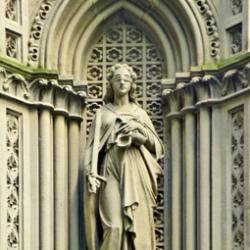We live in dangerous times . . . last year I drove to class and my car was covered with ash from burning homes. It was hard not to se it as a sign, and an apocalyptic one, for our culture. But I do not see it so: for one value of a great books education- the education that is the common core of HBU- is that it teaches us that history is a long story
Those that would heedlessly play with destructive cultural fire to gain pleasure, destroying in a moment the work of centuries in securing the possibility of liberty that is not libertine, family life that stands as a bulwark against statism, and education that nurtures and does not propagandize, risk much to gain too little.
Those that accidentally set destructive fires cause great temporal pain, but they also may in God’s wise Providence- where hapless evils can be turned to our good- be clearing away the underbrush and decay- and forcing good women and men to see the value of things in danger- precious things: the Constitutional order of 1789, the culture of life of John Paul the Great, and liberal arts education.
For we must not be confused- great books are important- but they are a means to an end. They are vital because they are the best teachers of virtue, but there are other ways to learn excellence.
We cannot ignore experience for bookishness. We cannot look only to the past, but also need what Sacred Scriptures calls “a progressive vision.” Glancing at the past is so we can go forward, not to stare at flaming Sodom with regret.
Christians are not reactionary, but conservative progressives: moving to the City of God while conserving the best of the past.
The four great pagan virtues (moderation, courage, practical wisdom, and justice) are summed up for us by Plato as the demand for justice: but justice, we are told by a greater than Plato is known by love. It is love of neighbor, of country, and in the end of God, that true education teaches.
Love, this kind of love- is not sloppy sentimentality found in the worst of Dickens and every Hallmark card- instead it begins in passion that recognizes poverty. We lack what we wish we had and worst see our neighbor, the beloved, in need.
I love something greater than I am and it is this lack that births education. We begin in doubt, questions, and uncertainty in the awesome love of the Beloved. The fanatic is certain, but the lover always doubts, not cynically, like modern day skeptics, but himself. He is not worthy, truthfully, of what love demands: goodness, truth, and beauty for the Beloved.
The lover, the student, challenges himself with doubt. This love builds to desire, a hypothesis of what might be, and finally knows, but that knowledge births new challenges. It is a never ending process of love!
The educated man or woman is whole, for he can afford to be a servant leader, who recognizes folk wisdom and serves the people without worshiping them. He can be become excellent, a leader, without worshipping the process, because love for his people motivated every move.
The fire that burns outside in our culture is dangerous, but it can become a fire within that purges and empowers: a Pentecost. God knows the evil men do, but He is willing to use it to consume confusions. We have thought 1950s American culture was His culture: that was a lie. We have confused the Founders of America with the Apostles: that was a lie. We can love our country without justifying its failings, just as we can love our families without pretending they are perfect.
Plato did not live to see the coming of Jesus, the God-Man who can make even the ugly torches of the mob or the abuse of power by leaders a martyrs cross- a new symbol of love. The crooked is made straight by Love, no idea can remain crooked before Love, and the twilight of any civilization, even this phase of the West, is simply a wait for a dawning Easter.
Jesus is Lord and so Love wins.












